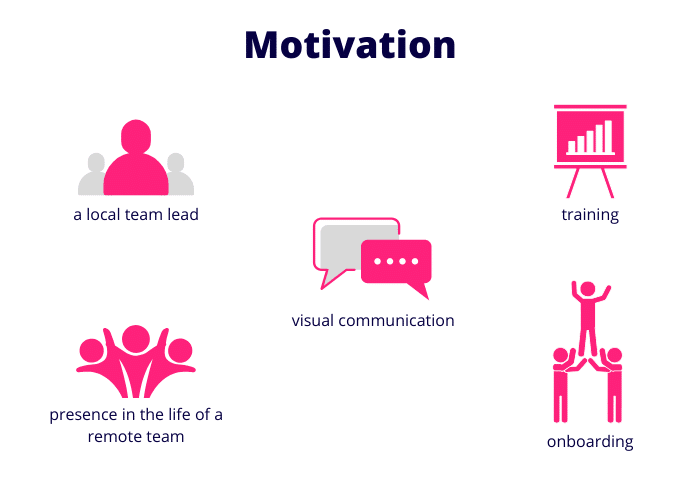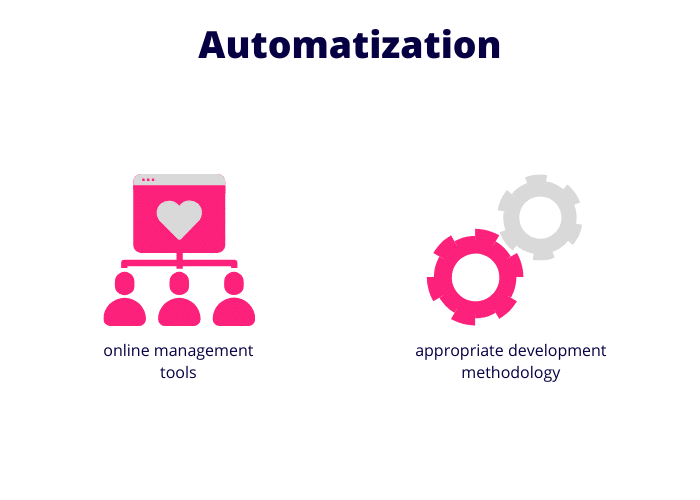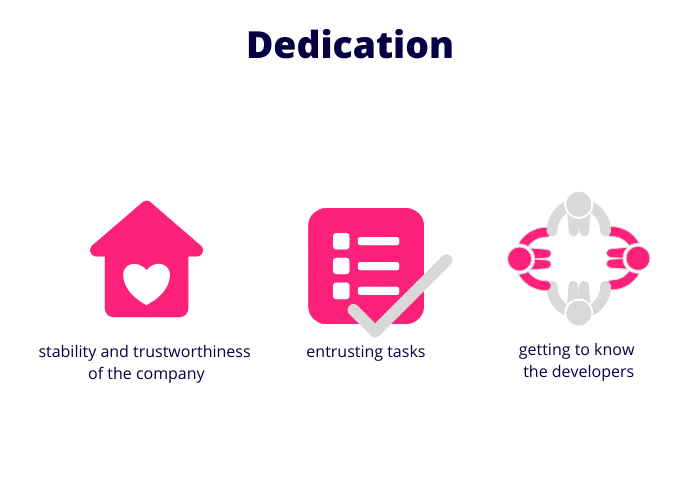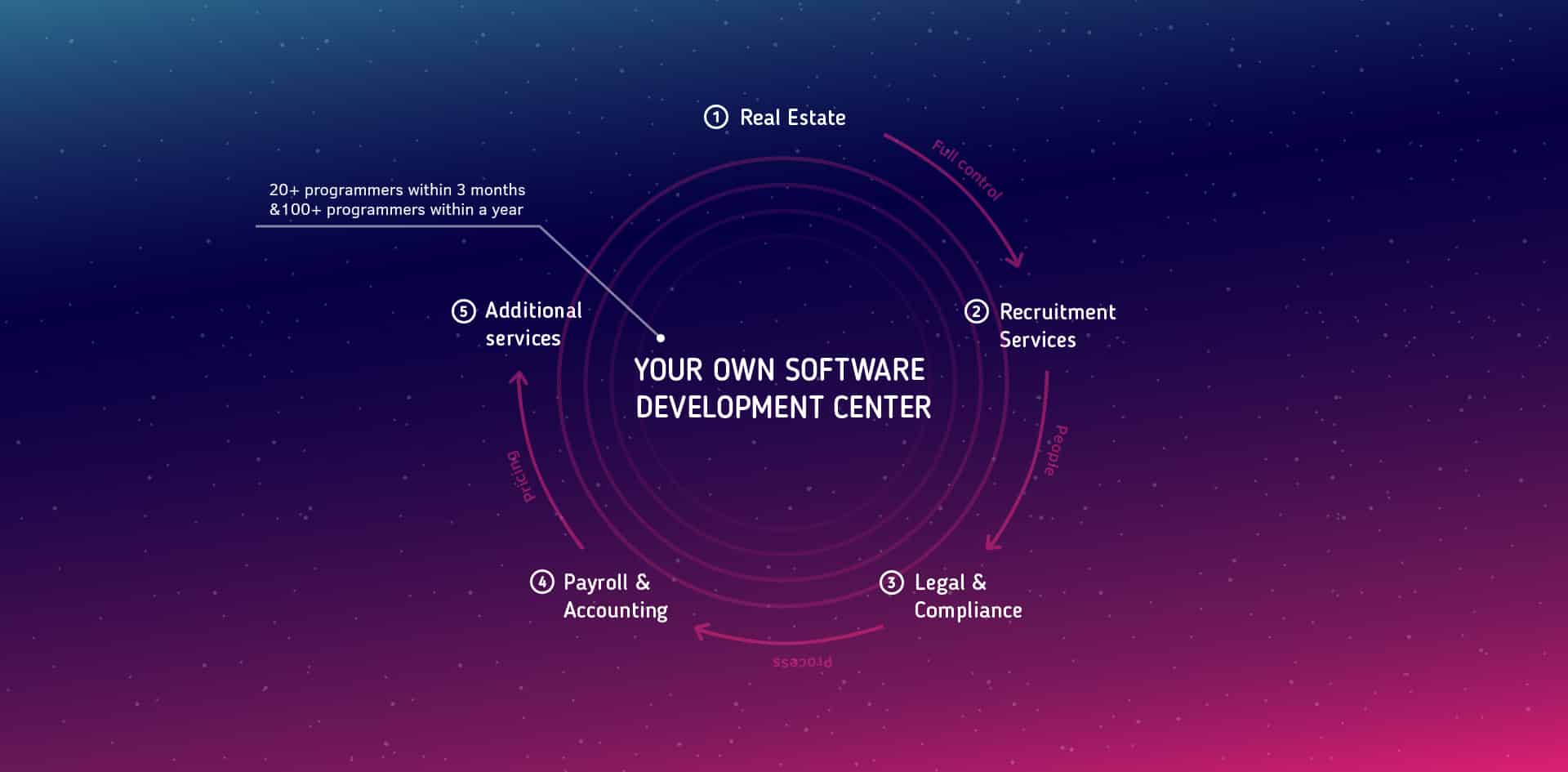Managing offshore development teams is never without challenges, yet when running an R&D office abroad the problems can dramatically escalate (if one fails to consider a range of factors). The good news is that working with a team offshore is actually quite like managing such a team in-house. That is why there are so many successful companies that use offshoring in tech from Europe and the US: People.ai, BigCommerce, Grammarly, Tonic Health, Certent, and others.
If you’re thinking about starting your own team offshore (or already have one but aren’t getting the expected results), this article will provide you with some practical advice and share great practices on how to manage offshore development team from leading tech companies. I’ve collected the best practices applied by world-famous companies in managing their development teams.
Differences in Managing Onshore and Offshore Teams
What is “managing offshore teams”? As we’ve already stated, managing your offshore team is almost the same as managing your in-house. You must follow similar principles, yet for offshore endeavors, it might require a bit more effort and time. For instance, managing an offshore hybrid mobile development team has its specifics. The three significant differences between an in-house and offshore team are:

Time difference and availability
With your in-house team, software developers are always available during your working hours. Therefore, they can easily solve urgent matters once such arise or promptly respond to your requests. So, you can easily call for an unexpected meeting and they will be available at a moment’s notice.
With an offshore software development center, time differences come into play. You might lack instant access to developers in a distant location and will often have to wait for clarifications. Also, their participation in brainstorming and meetings must be planned for everyone to attend them.
Belonging to a company
In-house teams easily feel a part of your company as they are always physically present in the building and can easily reach out to anyone in the office. Considering the distance, your offshore team might lack the feeling of being part of the company. They cannot be physically present, so it requires extra effort from you to help them identify with your company.
Culture
In your in-house team, most employees will be from your regular environment and will stick to the same cultural norms. This means you won’t face any serious problems in terms of communication. When you setup an offshore development team and start working with it, you will most likely notice that they may not completely share your worldview and follow specific cultural patterns. To ensure efficient cooperation between you, you must consider these cultural differences.
From the information above, you can see that there are no huge differences between managing your in-house and offshore team, at least that you must be afraid of and cannot handle. You can overcome most of the above differences by putting a bit more effort into building relationships with your remote team and setting transparent rules.
Challenges of Managing an Offshore Development Team
In their pursuit of IT talents, software companies take advantage of offshore developers. However, the issue of offshore team management often becomes quite challenging. Even though technology companies are good at digital communication, they may still feel frustrated when it comes to managing offshore development teams. Judging from my own experience, the core of a drastic communication gap between a tech company and its dedicated offshore team is rooted in the following aspects:

Remoteness
There is no need to explain why distance isn’t always sustainable for businesses. Nonetheless, software tech companies utilize offshore teams with ease because of the digital working environment that made it possible. Online communication is able to erase boundaries and contribute to a productive remote collaboration. Company leaders must find ways of managing offshore team effectively, and this will help them streamline the process of product development no matter the location.
Approaches to work
The working style is an intrinsic part of an effective collaboration inside the team, and tech leaders should pay enough attention to this. Sometimes the way an offshore developer approaches his/her work is different from the one your company has got used to. Eastern European engineers, for instance, are known to be perfectionists who treat their work seriously. They really strive for excellence and don’t finalize a task if the code doesn’t work well enough.
Such an attitude often bears little resemblance with other offshoring countries, where developers need to be additionally motivated to do their work extremely well. This good-or-nothing manner of handling a task also causes disagreements between dedicated offshore teams and their employer. To overcome this, engage your offshore development team in Eastern Europe to communicate their hurdles freely and speak up.
English level
Another potential issue may be the language of communication. Developers from emerging countries are not that good at English, so they experience difficulties when talking with their English-speaking employers. One of the tips to better managing offshore team is to simplify your language for them. This would help you stay on the same wavelength with your remote development team and eradicate misunderstandings. However, it’s possible to come up with the least burdensome offshore experience. For instance, in Ukraine IT specialists have a good command of English, so you won’t have to resort to “baby talk”. Give clear instructions with unsophisticated vocabulary, because odds are your offshore developers are not native English speakers.
4 Best Practices of Offshore Team Management
The challenge of managing offshore teams effectively has become extremely accurate during the covid-19 pandemic. Many businesses had to restructure their internal processes, go into digital, and help their employees work from home. For international tech companies that have several distributed teams of developers globally, this issue has not been groundbreaking. Having had a lot of dialogue with C-level managers from software companies, I’ve developed four main principles that will help you build a bridge between your distant teams, especially in turbulent times.
1. Motivate your Team
Employee motivation is a powerful tool of offshore team management that may bring amazing results for a company. Again, due to geographic distances it’s hard for managers to influence their remote team, especially when working with a vendor. Having an offshore team provider creates additional barriers, and why tech companies need to reconsider their engagement model to make the following tips for managing offshore development teams work.

Assign a local team leader
When starting a team, you not only need people who are motivated and enthusiastic, but also a true “leader” to drive them and assist in case of questions. This person will be a local team lead who will also act like a “communication channel” between you and the developers.
What is more, your team lead will keep under control the product development and relieve you of micromanagement or other time-consuming operations. A great lead will also take care of the software engineer work-life balance to ensure that your offshore developers are not overwhelmed with tasks, as well as operational management — to maintain the office in an appropriate fashion. If you want to get rid of this headache and rather focus on team building and product development, leave mundane tasks to us. At Alcor, we provide operational management support for software companies, including IT recruitment services, legal & compliance, business trips support, accounting services in Eastern Europe, etc. So, your team lead will be responsible only for his/her primary area of responsibility regarding the team and engineering.
Be Present in the Life of your Team
Though there will be a local team manager, some important advice for managing software teams is to be present. The secret to effectively managing offshore development teams is that your presence in the life of the R&D office should be evident – become a motivator for them and keep in touch as often as possible via online chats.
Don’t be afraid to “overcommunicate” – Eastern European developers become less reserved if you stay in constant touch with them – and to evoke more enthusiasm, don’t forget to praise your team often. This technique works well even for mature experts.
2. Unify your Teams
The principle of unification says that all your teams should act as a close-knit family; yet to make it a reality you need to apply a unified approach towards all members of your company (including those distant R&D offices).

Share your vision
It’s crucial to share your vision, corporate values, mission, and culture with all employees: include your remote R&D team in company meetings, big corporate events/parties, and strategic sessions, and this also concerns the common group chat for all company employees.
Initiate Visits and Business Trips
Many tech companies host their offshore teams at their headquarters. Don’t hesitate to invite them for induction trainings to your head office, introduce your company and key people, and conduct corporate meetings. In turn, you should also come to see the team’s local office to understand their environment. Indeed, on-site meetings on a regular basis sustain smooth communication and ease managing software development in the long run.
The great news here is that you don’t have to organize a business trip to bring your developers to the headquarters. Thanks to technologies, this is much easier now. For instance, for team education, presentations or demos, you can easily use Zoom or other software described below.
Plan meetings
Different time zones can be a real headache, so it’s advisable to decide on those time slots when you and the R&D team could communicate via Skype calls or online conferences. This solution will significantly save you time, as there will be no need for holding on the phone for long-awaited responses.
3. Automatize the Processes
Then, consider the software your new development team uses. It should be the same for both in-office and remote developers – in order to avoid errors within the system. Ensuring that everything works smoothly for the team members is part of the engineering management skills that every competent EM must obtain. If for technical reasons this is not possible, take care of the appropriate communication tools. Every decision-maker in tech realizes the importance of an online management system for good operational performance.

Another important issue concerns product development methodology. Developers in some countries, for instance, Asian ones, need strict rules and processes. Therefore, it’s better to find alternative ways for managing offshore teams in some countries. For Eastern Europe, Agile methodologies (with the opportunity for changes within the process) work better. And while American and European tech companies also prefer Agile, they won’t have to worry about the incompatibility of methodologies once they set senior software engeener goals in Poland or Romania.
4. Contribute to Dedication
The last but not least principle is dedication. This states that your new development team should be committed to the company they work for – and be eager to do their best for overall success. Nevertheless, the first step in nurturing commitment is trust. Relationships based on trust are always faithful and strong – therefore, say much about your company and its history, provide your team with necessary background information, and stay open.
Next, get to know them better. You may invite your development team for lunch and ask more about their country, culture, family, or lifestyle, etc. Poles and Romanians love to discuss cultural differences and demonstrate their national customs! Just add more informal talks to your communication and show interest in their lives.
Finally, make your R&D team feel valuable. Don’t task them with only support or maintenance work as it might offend them. You hired these tech specialists because of their professionalism, so give them a chance to show it. By completing some real work, the remote development team will be more than happy to contribute to the company’s success. This is also a nice tip for retaining the IT stars in your company, i.e. make them feel wanted and important and you will get commitment in return!

C-suite of the Leading Technology Companies about Offshore Team Management
People.ai is a San Francisco-based IT company that opened its R&D center in Ukraine several years ago. The company’s CTO Andrey Akselrod, who is accountable for R&D team management in Eastern Europe advises one to hire a country manager with whom you can establish trust. This person should know how to manage a software development project, as they will be your right hand in the local office. Their job is to hire, motivate, and retain the right people, as well as ensure corporate culture across your teams. Andrey states that for small offshore teams (less than 5 people) it’s enough to bring your project manager or senior technical lead over to Eastern Europe to help set up the process.
According to Andrey Akselrod, business trips mix cultures and develop “internal experience”. This is a good move towards fast onboarding, so bring your colleagues to Ukraine to meet the newcomers.
One of the most important perks for tech developers is believed to be training and opportunities for internal growth. Aleksander Radchenko, CEO at Radenia AG and an IT adviser, has extensive experience regarding the cultural aspects of managing software development teams remotely.
Aleksandr Radchenko states that Ukrainian IT specialists are remarkably effective if managed properly.
Ukrainian software developers are known to be quick and continuous learners, yet they sometimes lack emotional intelligence. That is why you should teach them the specific features of your tech business and give some soft skills training to boost project management and open opportunities for a team extension. This is much appreciated in Ukraine as software engineers here are really into their profession and value foreign practices. As stated by Aleksander Radchenko, developers in Ukraine have a high sense of ownership and commitment.
Brian Dhatt, CTO at BigCommerce, states that while opening their own R&D office in Eastern Europe he was especially concerned with enhancing motivation. He suggests preparing an onboarding plan for each team member, as this helps your newcomers better understand their career prospects inside your company (and in turn motivates them to work harder).
Brian Dhatt underlines the importance of showing stability and trustworthiness of your company, so demonstrate that your new R&D office is not an experiment but a full company branch with long-term prospects.
Tools for Better Managing Offshore Teams
According to statistics, over 70% of communication is non-verbal, which means that video calls are a good facilitation tool for more productive communication with remote teams. For this reason, be sure to use video for status calls, online conferences, and feedback. Video conferencing and visual contact with your development team may be realized with the help of the most popular software:
- Skype
- Zoom
- Microsoft Teams
- Google Meet
Messengers are another group of useful tools to enhance your communication with a development team overseas. They will assist you in demonstrating your openness for discussions and speed up the development process:
- Slack
- Yammer
- Hangouts
- Discord
- Telegram
- Microsoft Teams
In addition to this, never hesitate to make use of such cloud-based software like Trello, Jira, Asana and others, which really automate workflow management and provide effective collaboration. The value of these remote team management tools can hardly be overestimated. Just keep all the instruments simple and strive for clarity.
Final Thoughts
In conclusion, you should remember that the worst idea is to treat your remote R&D team as just a “gang of techies”. If you want to gather some real IT talent, implement simple actions and get rid of many unforeseen troubles. Keep in mind that managing offshore teams is very similar to managing employees in-house. Put these 4 principles (motivation, unification, automatization, dedication) into practice and start implementing the best practices for managing offshore resources. When you apply all the practices properly, remote developers are as qualified and dedicated as your in-office employees, and this is your key to ultimate success!
And in case you would like to start your own team in Eastern Europe or need a hand with understanding the local mentality, feel free to contact our business process outsourcing company. We will be happy to assist you with opening an office and handling all related activities. Our recruiters will hire local engineers for your company and provide analytical reports on the countries with lowest taxes in Europe and salaries of the most demanded software developers. These include the wages of Python engineers, PHP programmers, .NET specialists, JavaScript developers, Business Intelligence Developers, as well as Software Team Lead salary, and others. Upon request, we can take care of other operational processes, like office searches, legal support, and HR payroll.

FAQ
1. What are the common challenges of managing offshore development teams?
Among the main challenges of managing offshore engineering teams are long distance in combination with time difference, communication issues, and mindset dissimilarities. However, if building a team of developers in Eastern Europe, you will be able to avoid these problems. Read this article to learn more.
2. How can IT companies improve their offshore team management?
To make the offshore team management more efficient, it’s essential to motivate your development team, promote company values and culture, plan regular meetings, and make use of the online management tools, etc.
3. Which tools can facilitate the process of managing offshore teams?
You can integrate video conferencing and instant messaging tools to enhance your communication with the offshore development team. To make your cooperation even more productive, you can use cloud-based software like Trello, Jira, Asana, and others.
